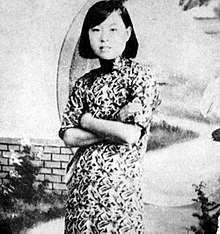| Tan Yuling | |||||||||
|---|---|---|---|---|---|---|---|---|---|
| Noble Consort Mingxian | |||||||||
 | |||||||||
| Born | Tatara Yuling (1920-08-11)11 August 1920 Beijing, Republic of China | ||||||||
| Died | 14 August 1942(1942-08-14) (aged 22) Xinjing, Manchukuo | ||||||||
| Spouse |
Puyi (m. 1937) | ||||||||
| |||||||||
| House | Tatara | ||||||||
| Father | Tatara Zhaoxu | ||||||||
Tan Yuling, Noble Consort Mingxian (born Tatara Yuling; 11 August 1920 – 14 August 1942), was a concubine of China's last emperor Puyi. She married Puyi when the latter was the nominal emperor of the puppet state of Manchukuo during the Second Sino-Japanese War. Her given name "Yuling" is sometimes translated into English as "Jade Years".
Biography
Yuling was born to the prosperous Tatara clan in Beijing, her family is a Manchu noble family. Her father Zhaoxu was a high-ranking warlord who administered the area around Beijing and Tianjin. Yuling's two aunts were in the Guangxu Emperor's harem as Consort Jin and Consort Zhen. Tan Yuling lost her parents when she was young, and she and her brother Tan Zhiyuan were raised by their aunt. Even after the Qing Dynasty fell, the Tatara clan continued to be very prosperous, but they changed their names to Tan, to avoid being discriminated for their Manchu ethnicity.

In early 1937, when Tan was still attending a middle school in Beijing, she was chosen to be a wife of Puyi and she travelled to Manchukuo's capital Xinjing (Changchun). On 6 April, she married Puyi in the Xinjing palace and was given the title of Imperial Concubine Xiang. Puyi liked her very much and asked Chen Zengju to teach her how to read Chinese books for six years. She became very close to Puyi after their marriage and in time, she became Noble Consort Xiang and became the manager of the Imperial Harem, as Empress Xiaokemin was not in favour anymore. Yuling reviled the Japanese.
Tan died in 1942 while being treated for cystitis less than a day after her Japanese doctor gave her an injection. The circumstances surrounding her death were suspicious because Tan was said to have resented the Japanese due to their control over Puyi. Kwantung Army staff officer Yoshioka Yasunori (吉岡安則), who was an attaché to the Manchukuo imperial household, once urged Puyi to take a Japanese bride, but Puyi had already married Tan, so he ignored Yoshioka. Yoshioka was said to be unhappy about this. Following Tan's death, Puyi was again pressed by Yoshioka to choose a Japanese spouse, but he refused.
Puyi granted Tan the posthumous title of Noble Consort Mingxian (明賢貴妃) and held a funeral for her in Banruo Temple (般若寺) in Xinjing. After the fall of Manchukuo in 1945, following the Japanese surrender at the end of World War II, Puyi ordered Tan's remains to be cremated and the ashes sent to her relatives in Beijing. Puyi kept a photograph of Tan with him until his death in 1967.
Gallery of Changchun House, Tan Yuling's former residence
-
 Changchun House. It was built in the early years of Manchukuo. Firstly, the fourth and fifth younger sisters of Puyi lived here. In July 1937, Puyi's father Zaifeng lived here. After Tan Yuling was coffered "Xiang Gui Ren", it became her residence.
Changchun House. It was built in the early years of Manchukuo. Firstly, the fourth and fifth younger sisters of Puyi lived here. In July 1937, Puyi's father Zaifeng lived here. After Tan Yuling was coffered "Xiang Gui Ren", it became her residence.
-
 Changchun House Living Room. Zaifeng used it in 1934, in 1937. It was also the receiving room of Tan Yuling.
Changchun House Living Room. Zaifeng used it in 1934, in 1937. It was also the receiving room of Tan Yuling.
-
 Changchun House Classroom, where Tan Yuling was taught.
Changchun House Classroom, where Tan Yuling was taught.
Notes
- "Puyi once accused the Japanese of killing his wife Tan Yuling".
- 王庆祥: 溥仪和他的五个女人. 北京: 团结出版社, 2008-06: 125-135
- 秦翰才《满宫残照记》1946: 康德四年(一九三七)三月二十五日,溥仪册立他他拉氏为庆贵人,宫中却呼为“董贵人”。她是生长在北平的,那年才十八岁。溥仪很喜欢庆贵人,还请陈曾矩教他读了六年的中文书。康德九年(一九四二)八月十三日庆贵人死了,溥仪很是伤心,追封为明贤贵妃,殡宫在般若寺。我既得知还没有奉安园寝,曾到寺访问,殡宫实在藏经阁后,屋中只有一棺,棺前只有一案,灵前陈设已空无所存,极凄凉萧瑟之至。东壁有溥佳杂物一堆,寺僧指结婚照一帧道:“这就是溥佳夫妇(溥佳要存耆从弟索樾坪之妹,名溥索,号鹏云)。”两人日记,也在这里拾得。回顾西壁还有一棺,很觉骇异,读其铭,方知此中长眠人为在长春战役中牺牲之一位地下工作同志。寺僧又说:“当康德皇帝在日,这里有禁卫看守,不容闲人擅入。”方外人也不胜今昔之感了!……十二、手足间的温情和谐趣……(康德四年[一九三七])二月十日韫颖谨禀敬禀者:奉廿二三号手谕,敬悉二月廿五日举行册封贵人典礼,颖谨此谨叩大喜。今日是杰之结婚日……
- Emperor Xuantong Archived 2007-11-16 at the Wayback Machine GoChinaTravel.com
References
- Behr, Edward (1977). The Last Emperor. Bantam. ISBN 0-553-34474-9.
- Puyi, Edward; Paul Kramer (1967). the Last Manchu; the Autobiography of Henry Pu Yi, Last Emperor of China. Putnam. ASIN: B000NRUCZ8.